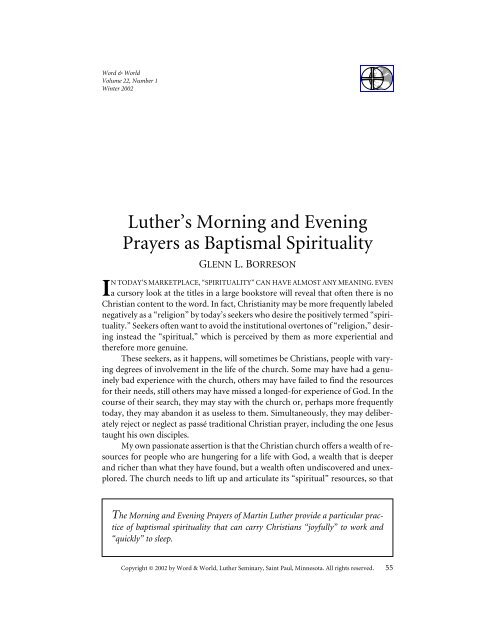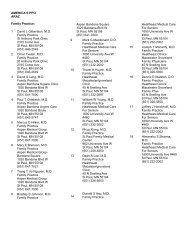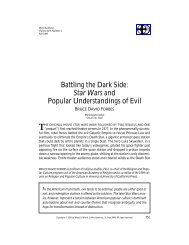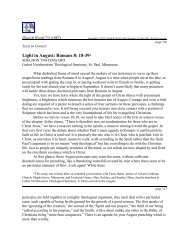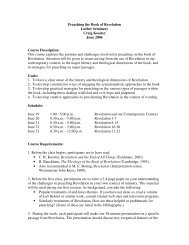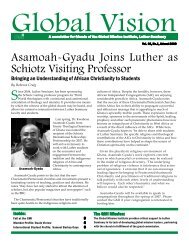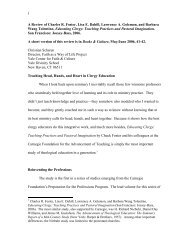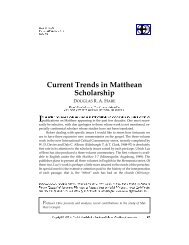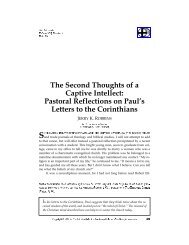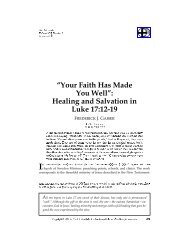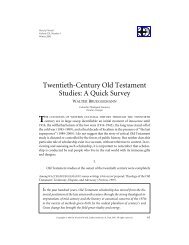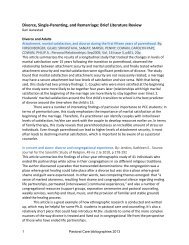Download Article PDF - Word & World - Luther Seminary
Download Article PDF - Word & World - Luther Seminary
Download Article PDF - Word & World - Luther Seminary
You also want an ePaper? Increase the reach of your titles
YUMPU automatically turns print PDFs into web optimized ePapers that Google loves.
<strong>Word</strong> & <strong>World</strong><br />
Volume 22, Number 1<br />
Winter 2002<br />
<strong>Luther</strong>’s Morning and Evening<br />
Prayers as Baptismal Spirituality<br />
GLENN L. BORRESON<br />
N TODAY’S MARKETPLACE, “SPIRITUALITY” CAN HAVE ALMOST ANY MEANING. EVEN<br />
a cursory look at the titles in a large bookstore will reveal that often there is no<br />
Christian content to the word. In fact, Christianity may be more frequently labeled<br />
negatively as a “religion” by today’s seekers who desire the positively termed “spirituality.”<br />
Seekers often want to avoid the institutional overtones of “religion,” desiring<br />
instead the “spiritual,” which is perceived by them as more experiential and<br />
therefore more genuine.<br />
These seekers, as it happens, will sometimes be Christians, people with varying<br />
degrees of involvement in the life of the church. Some may have had a genuinely<br />
bad experience with the church, others may have failed to find the resources<br />
for their needs, still others may have missed a longed-for experience of God. In the<br />
course of their search, they may stay with the church or, perhaps more frequently<br />
today, they may abandon it as useless to them. Simultaneously, they may deliberately<br />
reject or neglect as passé traditional Christian prayer, including the one Jesus<br />
taught his own disciples.<br />
My own passionate assertion is that the Christian church offers a wealth of resources<br />
for people who are hungering for a life with God, a wealth that is deeper<br />
and richer than what they have found, but a wealth often undiscovered and unexplored.<br />
The church needs to lift up and articulate its “spiritual” resources, so that<br />
The Morning and Evening Prayers of Martin <strong>Luther</strong> provide a particular practice<br />
of baptismal spirituality that can carry Christians “joyfully” to work and<br />
“quickly” to sleep.<br />
Copyright © 2002 by <strong>Word</strong> & <strong>World</strong>, <strong>Luther</strong> <strong>Seminary</strong>, Saint Paul, Minnesota. All rights reserved. 55
Borreson<br />
its own members, plus a hungering world, can know and experience God, the Father<br />
of Jesus Christ, in ways they may have been missing. The attempt of this essay<br />
is to articulate a powerful spiritual resource from within the <strong>Luther</strong>an tradition of<br />
the catholic faith in which the Lord’s Prayer is a vital element.<br />
I. THE RADICAL EVENT OF BAPTISM<br />
Martin <strong>Luther</strong> is reported to have said that Christians receive enough of Jesus<br />
Christ in their baptism to spend their whole life learning what this means. Clearly<br />
baptism is more than a simple childhood ritual. Baptism is a powerful bonding to<br />
Christ, dying with him to sin and rising with him to new life. In baptism, every<br />
Christian receives Christ as the sacramental pro me or “for me” and, in faith, is<br />
called to experience this same Christ through daily dying and rising.<br />
In fact, Christians are called to the repeated faith discovery that in dying and<br />
rising with Christ, all that Christ is, all the gifts that Christ brings, belong to them.<br />
In Christ, death is in the past for the Christian, and life as a gift of God is their future.<br />
What happened with Jesus will happen to them. In the sacrament of Holy<br />
Baptism, God creates a binding union of Christ with the believer both to sustain<br />
faith and to be grasped by faith.<br />
The spirit of <strong>Luther</strong>’s understanding of the faith is observed in his deliberate<br />
remembrance of his baptism. In the dark and desperate days when he was being<br />
hidden in the Wartburg Castle, he defied the devil’s power with the words, “I am<br />
baptized!” This heart-rending plea is a promise-grasping call to God that he (<strong>Luther</strong>)<br />
remain within the mercy of the Lord Jesus Christ. His baptism was not a deed<br />
closed in a dusty past but an event open to and contemporaneous with him in his<br />
most tortured moments. Despite all the raging terrors, God in Jesus Christ was for<br />
him and with him. Through Jesus, God was to <strong>Luther</strong> “Father,” parent, “abba”; in<br />
Jesus, God was experienced as the one who prayed “our Father” with him. Even if<br />
that presence was not <strong>Luther</strong>’s only experience in those moments, surely it was the<br />
basis of the faith that both embraced and surpassed his experience. In Christ, <strong>Luther</strong><br />
died and rose; he died to the doubt that terrorized him with unbelief, and he<br />
rose to faith and the embrace of life. That is, he not only knew the gospel, he lived<br />
and experienced it.<br />
<strong>Luther</strong>’s Wartburg experience of baptismal faith was, I believe, neither so rare<br />
nor extraordinary as the <strong>Luther</strong>-lore approach to this event might lead us to believe.<br />
In fact, his Morning and Evening Prayers included in some editions of his<br />
Small Catechism are a distinct and clear echo of the same kind of “baptismal spirituality”<br />
that <strong>Luther</strong> himself lived, not only in Wartburg Castle but throughout his<br />
life. These prayers were his way to teach the Christians of his day to pray as much as<br />
the Lord’s Prayer was Jesus’ way to teach his first disciples. It should be no surprise<br />
that <strong>Luther</strong> includes Jesus’ own teaching prayer within his Morning and Evening<br />
Prayers.<br />
My attempt, however, is not to make my point by historical documentation,<br />
56
<strong>Luther</strong>’s Morning and Evening Prayers<br />
but to highlight the Morning and Evening Prayers as an example of what I am calling<br />
“baptismal spirituality,” that is, the acts and attitudes for Christian practice<br />
arising out of God’s radical deed in baptism. In making this attempt, I want to include<br />
as a dialog partner not only <strong>Luther</strong>, but also, usually indirectly, the seekers<br />
who may not know the resources deep within Christian faith and history.<br />
II. “IN THE NAME”<br />
In the morning, as soon as you get out of bed, you are to make the sign of the holy<br />
cross and say: “God the Father, Son, and Holy Spirit watch over me. Amen.”<br />
In the evening, when you go to bed, you are to make the sign of the holy cross and<br />
say: “God the Father, Son, and Holy Spirit watch over me. Amen.” 1<br />
These prayers call Christians to begin their day by declaring the name and<br />
identity of their God. The world, after all, is not neutral territory but the realm<br />
where the powers contend. It is often Dark Territory, in the words of a movie title, a<br />
realm where we can surely wonder if we are beyond the reach of God. At the beginning<br />
of the day, though it be dark or hostile, Christians claim the day in the very<br />
name of the God who claimed them at their own beginnings in baptism. There is a<br />
confidence in knowing that, despite all appearances or in the midst of every grace,<br />
the day belongs to God.<br />
Hours later, the day will conclude, and Christians will again declare that it belonged<br />
to God, as will the coming night. Whatever machinations of principalities<br />
and powers, whatever the siren songs of false gods and goddesses, the truth of this<br />
particular God addresses Christians, facing both day and night and framing both.<br />
The name of “Father, Son, and Holy Spirit” is the sign that God in all fullness<br />
is the God with whom we begin the day. While the Bible has many names for God<br />
and more descriptions, the name that Christians use to begin their day is the Trinity:<br />
God in fullness of majesty and mystery, but at the same time, God revealed to<br />
us. The triune name of God declares that we know specifically who God is and that<br />
the God we know is completely with us in the world. Just as in baptism, the whole<br />
of our future is claimed in Christ who has put death behind us, so in the Morning<br />
and Evening Prayers we live the more modest truth that the immediate future of<br />
day or night is secure in God.<br />
Perhaps this is the point to notice that <strong>Luther</strong> writes, “say, ‘In the name....’” 2<br />
There is good reason not merely to think the words, or even to whisper them, but<br />
actually to do what <strong>Luther</strong> writes: to speak the invocation aloud! The God who is<br />
<strong>Word</strong> uses words once again to inhabit believers and their world. Surely, there is a<br />
psychological strength to speaking aloud, and this spoken word also “remembers”<br />
1 Martin <strong>Luther</strong>, “The Small Catechism,” in The Book of Concord: The Confessions of the Evangelical <strong>Luther</strong>an<br />
Church, ed. Robert Kolb and Timothy J. Wengert (Minneapolis: Fortress, 2000) 363.<br />
2 The Book of Concord (note 1) translates <strong>Luther</strong>’s German version of the prayers. The familiar “In the name<br />
of the Father, Son, and Holy Spirit” comes from the Latin version. See Die Bekenntnisschriften der evangelischlutherischen<br />
Kirche, 10th ed. (Göttingen: Vandenhoeck & Ruprecht, 1986) 521.<br />
57
Borreson<br />
baptism; but the basic reason is that God is <strong>Word</strong> and this God employs words to<br />
create faith. To speak these words is to participate in God.<br />
III. THE SIGN OF THE CROSS<br />
The sign of the cross, <strong>Luther</strong> says, is to be made upon oneself while speaking<br />
the name of God. If beginning the day in the name of God claims time for God,<br />
surely the sign of the cross made by believers upon themselves claims them for<br />
God.<br />
Very early, the Christian community began using the sign of the cross to<br />
mark their being claimed by Jesus Christ. These Christians were, of course, familiar<br />
with the common practices of marking cattle, slaves, or other possessions for ownership.<br />
It was an understandable, if not natural, move for Christians to begin crossing<br />
themselves as belonging to their Lord. In a world where many of the first<br />
Christians were poor, even slaves, the sign of the cross must have been genuinely<br />
liberating. No matter what their worldly masters said or did, these Christians belonged<br />
to Jesus Christ! That gift, that new status, was given them in their baptism,<br />
and forever after they would bear the mark of Christ. Amidst whatever suffering<br />
they endured in the course of their daily living, the cross was their sign of triumph.<br />
They who had died with Christ would also rise with him. They belonged to Christ,<br />
and Christ would assure their future.<br />
In the movie The First Wives Club, the three feature actresses conclude with a<br />
rousing rendition of the song, “You Don’t Own Me.” In both that film and contemporary<br />
life, there is a often a strong hunger for and sometimes loud cries from<br />
people to be themselves, free of restraint of society, spouses, the past, and so on.<br />
The Christian faith declares that the closer we are to Christ, the more we become<br />
our true selves. The claim that Christ makes on us in baptism as we are marked by<br />
the sign of the cross is not to be escaped from but yielded to, and in that yielding,<br />
which is dying, our true selves are given. If Christ did not love us, and if that same<br />
cross were not the one upon which he had died, then perhaps our escape would be<br />
desirable. The cross we make upon ourselves is, however, not just a sign of belonging<br />
to Christ, but a belonging to the very one who dies for us. This love, as the name<br />
of God itself reminds us, is at the center of God’s very life.<br />
To make the sign of the cross is binding and liberating at the same time. It<br />
binds us to Christ who is victor over all the false powers that would have us and<br />
ruin us. It liberates us from the demonic powers that inhibit us from becoming the<br />
people we became, and were called to become, in our baptism. Only Christ owns<br />
us—not our country, not our family, not our job, not our possessions, nothing at<br />
all. That, of course, may not be the way we think and live, but it is the reality we<br />
have and yet don’t have at one and the same time. It is the reality we are dying for<br />
and rising into, and it becomes the home that overcomes our terrible alienation. It<br />
is the reality we have in Christ.<br />
We need to restore the sign of the cross to piety or spirituality as a lived re-<br />
58
<strong>Luther</strong>’s Morning and Evening Prayers<br />
membrance of our baptism and a step on our journey toward our true freedom,<br />
which can only be found in Christ. The very physicality of the sign—the touch of<br />
the sign-making hand on the body—makes our freedom in Christ tangibly real; it<br />
cannot be “spiritualized” out of existence. In fact, this touch of the cross is something<br />
like the eucharistic words “for you” accompanying the bread or wine: its direct<br />
application means there is no avoidance; the cross is specifically “for you.”<br />
In a baptismal spirituality, the physicality of the sign of the cross would be<br />
underlined by the use of water at the same time. Even though <strong>Luther</strong> didn’t suggest<br />
this, Christians could “let it soak in” as they make the sign at the bathroom sink or<br />
in the shower at the opening or close of the day. Our God is neither gnostic nor docetic,<br />
avoiding the things of earth for so-called higher matters. We don’t get to God<br />
by being more “spiritual” than God, but as <strong>Luther</strong> himself indicated, we find God<br />
where God will be found, in word and sacraments. The realities of the touch of the<br />
cross and water live in baptismal spirituality.<br />
IV. THE APOSTLES’ CREED AND LORD’S PRAYER<br />
Then, kneeling or standing, say the Apostle’s Creed and the Lord’s Prayer. 3<br />
If the invocation names God, then the Creed serves to direct the Christian to<br />
what God has done and continues doing. God is known in words and story, by acts<br />
that can be described and talked about. The Creed is a summary of the contents of<br />
the whole of Scripture, the stories which have become ours in Jesus Christ. To recite<br />
the Creed—again, aloud—is to do more than recite ancient history: it is to<br />
know our life described in the words we are saying and hearing. The story of the Father,<br />
Son, and Spirit becomes our story. In fact, in faith we are drawn up into the<br />
very life of God. What mystery! Our verbal remembering in the Creed resonates<br />
throughout our body, mind, and spirit as we hear the wind move over the waters in<br />
creation, as we walk through the slush-bottomed Red Sea, as we repent at the call of<br />
John the Baptizer, as we die and rise with Jesus. As we remember, we are formed<br />
and shaped by the stories encapsulated in the ancient Creed.<br />
The coupling here of Creed and Prayer by <strong>Luther</strong> makes clear the direction of<br />
the baptismal spirituality that I see demonstrated, if not modeled, for us. It may be<br />
possible, even if wrongheaded, for Christians to recite the Creed as past or distant.<br />
After all, it is a rather spartan formulation compared to the drama of the Scriptures.<br />
The placement of the Lord’s Prayer immediately following, however, compels<br />
the believer to prayer, that is, to enter into dialog with God, the Father of Jesus,<br />
the same God described in the Creed. It is as if the Creed drives one to stumbling<br />
humility and awesome gratitude before God and then the Lord’s Prayer is offered<br />
by Jesus as a way to pray for those who have no words of their own.<br />
In the Lord’s Prayer, Jesus gives us a way to the Father, through Jesus himself,<br />
that we might enter into the life and love of God. When we pray, “Thy kingdom<br />
3 “The Small Catechism,” 363.<br />
59
Borreson<br />
come,” we are recognizing that our Lord must take us where we cannot go alone, to<br />
a realm where we shall love, for example, as the Father and Son love each other.<br />
When we continue, “Thy will be done,” we know as our companion Jesus, the one<br />
who did God’s will like no other human. This Jesus, who died and rose, holds us in<br />
his grasp in the terror and liminality of our own dying and rising. By ourselves, we<br />
would only stumble and fumble, but in Jesus—who is ours as we are his—we have<br />
received all that we need. In Creed and Prayer, we have received the fullness of the<br />
story of God and the gracious avenue by which we might enter the life of God who<br />
is Father, Son, and Holy Spirit.<br />
A baptismal spirituality has content. That content is not what we decide it to<br />
be—by mysticism or rationalism, for example—but that content is given as we are<br />
formed by the Christ of the Scriptures. That means knowing the Bible’s stories<br />
—knowing them as our stories. It means knowing our Lord’s Prayer as gift-words<br />
from Jesus that open unique directness to the heart of God. It means grace-filled<br />
intimacy, being able to use Jesus’ own words, the words of the “beloved Son,” to<br />
approach God.<br />
V. LUTHER’S PRAYERS<br />
Baptismal spirituality moves closer to its goal in the specific Morning and<br />
Evening Prayers that <strong>Luther</strong> himself wrote for the Christian’s use. After reciting the<br />
awesome expanse of God’s works in the Apostles’ Creed and then being humbly<br />
drawn close to the Father’s heart in Jesus’ prayer, Christians are led by <strong>Luther</strong>’s<br />
words into personal, down-to-earth prayer. It is not enough to know about God<br />
nor even to enter into the heart of God. In prayer, believers, who belong to Christ<br />
and are in union with Christ, reenter the daily dying and rising with Christ that is<br />
the staple of their spirituality.<br />
Thanksgiving, of course, is the doorway of <strong>Luther</strong>’s prayer, both morning and<br />
evening, reflecting especially upon protection. One is reminded again of all that is<br />
so ordinary: the things that could have gone wrong that didn’t, the things we worried<br />
about that thereby wasted our time and warped our spirit. Thanksgiving, being<br />
response to God’s initiative, is always baptismal spirituality.<br />
I give thanks to you, my heavenly Father, through Jesus Christ your dear Son,<br />
that you have graciously protected me today, and I ask you to forgive me all my<br />
sins, where I have done wrong, and graciously to protect me tonight. For into<br />
your hands I commend myself: my body, my soul, and all that is mine. Let your<br />
holy angel be with me, so that the wicked foe may have no power over me.<br />
Amen. 4<br />
The Evening Prayer models and enacts the dying and rising pattern of our<br />
lives. <strong>Luther</strong> prays God “to forgive me all my sins, where I have done wrong.” The<br />
ways that Christians have missed the mark, whether through omission or commis-<br />
4 Ibid., 364.<br />
60
<strong>Luther</strong>’s Morning and Evening Prayers<br />
sion, need to come to an end, be forgiven, and die. How the past holds and binds<br />
us! How we are gripped by sin, either by never letting it go or by never acknowledging<br />
it. Here, however, is just the straightforward confession—no dwelling on sin,<br />
no detailing of it. Here is <strong>Luther</strong>’s typical unselfconscious faith that focuses on<br />
Christ alone and, in that very focus, becomes death to sin. In the very next sentence,<br />
the future becomes the focus: protection during the coming night, recognition<br />
of being in God’s hands, safety from evil’s powers. The past is forgiven. The<br />
future is in God’s hands. Clearly, rising—be it in the morning or in the resurrection<br />
of the dead—is in God’s hands.<br />
I give thanks to you, my heavenly Father, through Jesus Christ your dear Son,<br />
that you have protected me through this night from all harm and danger, and I<br />
ask you that you would also protect me today from sin and all evil, so that my life<br />
and actions may please you completely. For into your hands I commend myself:<br />
my body, my soul, and all that is mine. Let your holy angel be with me, so that the<br />
wicked foe may have no power over me. Amen. 5<br />
<strong>Luther</strong>’s Morning Prayer has an expanded thanksgiving for protection<br />
through the night just past. One might expect this, since that protection was a<br />
granted request. The dying and rising takes a different shape in this prayer, for <strong>Luther</strong><br />
is fully aware of all the ways our human “thoughts, words, and deeds” 6 can be<br />
caught up in sin and evil. Consequently, Christians are not directed to pray to be<br />
just a little better than yesterday. Rather, they are directed to pray that everything<br />
“please you [our heavenly Father] completely.” That sounds like death, being<br />
tossed back on the mercy of Christ, for what do we do that pleases God completely—especially<br />
after we have pridefully convinced ourselves that we have<br />
pleased God!<br />
After singing a hymn perhaps (for example, one on the Ten Commandments) or<br />
whatever else may serve your devotion, you are to go to your work joyfully. 7<br />
The actual formation of Christ in Christians’ lives, our rising in Christ, may<br />
again be anticipated in <strong>Luther</strong>’s prayer, but the singing of the hymn that follows is<br />
the way Christians praise God for the new life in Christ. The fact that <strong>Luther</strong> may<br />
be considering the shape of this life set free in Christ is indicated by his suggestion<br />
that the hymn be “one on the Ten Commandments.”<br />
VI. DOING THE DYING AND RISING<br />
Unless we engage the last line of <strong>Luther</strong>’s full orders of prayer, I would contend,<br />
we still may miss the point. In the Evening Prayer, he simply concludes,<br />
5 Ibid., 363.<br />
6 “Thoughts, words, and deeds” is the familiar phrase used in the 1959 Book of Concord edited by Theodore<br />
Tappert (p. 352) and in Responsive Prayer 1 of the <strong>Luther</strong>an Book of Worship (p. 163). The Book of Concord of 2000<br />
translates <strong>Luther</strong>’s “mein Tun and Leben” as “my life and actions” (p. 363).<br />
7 “The Small Catechism,” 363.<br />
61
Borreson<br />
“Then you are to go to sleep quickly and cheerfully.” 8 In those simple words we<br />
find the practice of the whole order of prayer, for here Christians actually practice<br />
dying! The time after prayer is not the time to do one more thing, to lie awake over<br />
a troubling sin, or to worry about tomorrow. Now, after commendation to the<br />
hands of God, it is time to die. That is, it is time to trust the Father of Jesus, to allow<br />
to perish the old self’s managing of the world’s problems, and to fall asleep. Period.<br />
The Evening Prayer is a marvelous example of baptismal spirituality not only<br />
because it recalls great baptismal themes, but even more because it calls forth the<br />
dying and rising with Christ that is foundational to life. Simply falling asleep in<br />
peace is real dying for the old self, who is never done with the world, who is sure<br />
that God cannot handle it alone. Every aspect of life, every vocation to which we are<br />
called, will have its own kinds of dying. In fact, <strong>Luther</strong> was so sure of this that he<br />
said Christians would not need to seek opportunities to die. They would be provided<br />
them aplenty.<br />
Morning Prayer ends on a different note, of course: specifically, that “you are<br />
to go to your work joyfully.” 9 In baptism, every Christian receives a calling into a<br />
life that is being formed by Christ and his Spirit in kindness, patience, gentleness,<br />
courage, and much more. Work is the exercise of part of that calling, though by no<br />
means all of it. To go to work may require, at least on certain days, a dying to self.<br />
In other words, Christians might rather stay in bed or go fishing, but instead, they<br />
arise to repair engines and prepare food and thereby the neighbor is served. A dying<br />
may have occurred, even a rising in Christ, however much the world may only<br />
see the same old person.<br />
To go to work “joyfully” often is a challenge, but beneath that word the believer<br />
recognizes a promise larger than human emotions and personalities. Joy is<br />
the proper note sounded by Christians who know the deep and powerful truth<br />
that, in Christ, our dying is turned into rising. This joy is not a bubbly or giddy delight<br />
that “everything is wonderful,” but an abiding in the confidence that Christ<br />
will have the day no matter what unique turns it may take.<br />
VII. A TIMELY SPIRITUALITY<br />
The spirituality of <strong>Luther</strong>’s Morning and Evening Prayers is not a remote and<br />
pious relic of the past, but a model addressing the hunger of people, even Christians,<br />
yearning for an authentic life with God. The path to truth is not found in a<br />
new amalgam of spiritual truths from many sources, put together by either individual<br />
whim or wisdom, but in deep immersion in unique and particular faith.<br />
Here that particular is a Christian practice lived out knowledgeably and faithfully.<br />
The spiritually hungry persons who immerse themselves in <strong>Luther</strong>’s Morning and<br />
Evening Prayers stand to gain many things:<br />
• a participation in the mystery of the holy and Triune God<br />
62<br />
8 Ibid., 364.<br />
9 Ibid., 363.
<strong>Luther</strong>’s Morning and Evening Prayers<br />
• an involvement of the physical body as well as the spirit<br />
• a sense of belonging both to God and to God’s people<br />
• a life rooted in stories of God and people<br />
• a recovered intimacy in praying the Lord’s Prayer with Jesus<br />
• a uniquely personal trust in dying and rising<br />
• an authenticity of faith experience.<br />
The point of this short list, created in a dialog with my readings about the<br />
spiritual hungers of our time and attempts to meet them, is not to accommodate<br />
the gospel of Jesus Christ to the marketplace, but to underline the truth that the<br />
church possesses resources for effective ministry that we simply have not used. One<br />
of these resources, <strong>Luther</strong>’s Morning and Evening Prayers, echoes a baptismal<br />
spirituality as rich and powerful as the sacrament to which I have indicated it is<br />
connected. Ministers—especially, but not only, <strong>Luther</strong>an ones—can offer this to<br />
congregations, to individuals, and to families as a solid spiritual resource for regular<br />
practice. We need to renew its practice, because it connects us with faith’s primordial<br />
experience: dying and rising, becoming a new creation in Christ. In a time<br />
when people hunger for adventure, openness, stability, relationship, and the new<br />
and novel in many and varying ways, these prayers of Martin <strong>Luther</strong> deserve a recommendation<br />
for the journey.<br />
GLENN L. BORRESON is administrative pastor of Holmen <strong>Luther</strong>an Church in Holmen, Wisconsin.<br />
63


